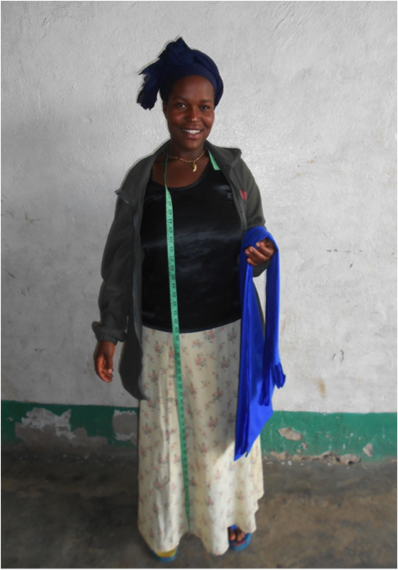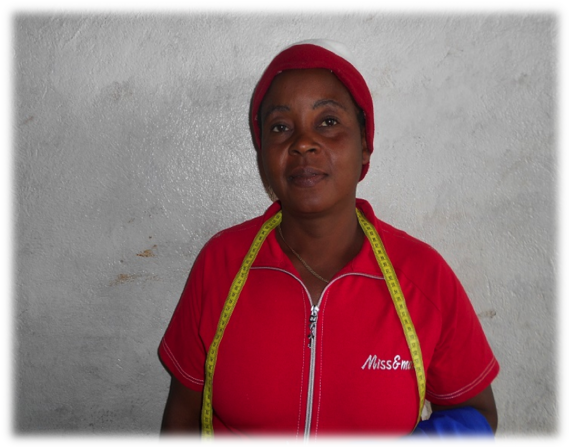Respect. We all want it and we know we have to earn it. For women who live in patriarchal societies, who have never been given a chance to learn and who grapple each day with the crushing burden of extreme poverty, that can be quite a challenge. It doesn't mean they crave respect any less.
Furaha Borive, a 40-year-old from eastern Democratic Republic of Congo, has now got it. And that may be the greatest gain from the tailoring program she signed up to a year ago.
Furaha's husband is a teacher, but his salary did not stretch far enough to cover the family's needs. Last year, Furaha decided to take matters into her own hands and enrolled in a tailoring class run by emerge poverty free in partnership with the Bunia Children's Hope Center and The Aspire Foundation.
"I have already opened my own shop and started sewing clothes for customers," said Furaha. Now, she helps cover the household costs, and sews clothes for her four daughters, her mother and herself. But there is something else.
"This has given me some power in the family, because before I had to wait to get everything from my husband. These days, my husband gives me much respect because I am helping him by covering some of the family's expenses," she said.
Furaha's experience goes to the heart of the link between development and gender equality.
This year, Global Entrepreneurship Week from November 17 - 23 is driving a worldwide movement to engage and support female entrepreneurs, like Furaha. It has designated November 19 as Women's Entrepreneurship Day to celebrate, engage and empower female entrepreneurs. The idea is to promote female entrepreneurship and focus attention on female development and empowerment to help strengthen the ecosystem as a whole.
At emerge poverty free, we have seen the effects of this empowerment on the ground in East Africa, where we run a variety of projects to educate and train women, working closely with local partners like the BCHC in eastern DRC.
The people living in this area -- just 40 km from the border with Uganda -- have paid a heavy price for years of conflict over the region's rich resources. The tailoring project aims to give women a chance to move beyond a hand-to-mouth existence that is both precarious and soul-destroying.
To start with, there were 15 hand-operated sewing machines -- more efficient than electric ones in a region where power cuts are frequent -- and 50 women signed up for training. Since then, 20 more machines have been purchased.
The potential of women entrepreneurs is enormous: The International Labor Organization says that there are 812 million women in emerging and developing countries who could contribute more to their economies. That's an amazing number and a powerful force if these women were trained, financed and encouraged to take the organizational skills that keep their families going to another level.
The impact of women's empowerment on development goals is a given: If women are educated, child mortality rates often fall, school enrollment rates increase and poverty levels drop.
In Bunia, the tailoring course has helped women build on their natural skills for entrepreneurship in a region where the state is largely absent and where doing business is a necessity. The training offered gives these women choices, and a chance to expand.
Esperance Mamila was already selling second-hand clothes before she did the training course. Her husband had given her some money to start her business.
"Normally when I bought the second-hand clothes from the shop... we often got clothes in big sizes, which people cannot wear here in Bunia. I used to put the big clothes aside for the tailor to repair. But the expense made me lose a lot of money. Now since I have finished my training, I am able to repair the big clothes... This has helped me increase our family income a lot," the 57-year-old mother-of-six said.
Sub-Saharan Africa has the highest number of female entrepreneurs in the world. According to the World Bank, around 63 percent of women in the non-agricultural labour force are self-employed in the informal sector. That's twice the worldwide rate.
In Bunia, emerge poverty free and BCHC also fund and organize the Women in Development Program, building on this natural trend for entrepreneurship.
Women who have taken orphans into their homes under BCHC's foster program are taught numeracy and basic business management. When they graduate, they go on to work with BCHC to manage a savings and loan program. Women use the loans to buy fruit, vegetables, fish, flour or farming supplies. Sometimes, they use the money to buy iron roofs for their homes,
small plots of land, or to pay school fees.
Across East Africa, emerge poverty free aims to harness this incredible energy to help people help themselves. We believe in giving people the skills they need to lift themselves out of poverty. We don't wear rose-tinted glasses and so we know it will not happen overnight. But we are in these communities for the long-haul. We try to address multiple problems at the same time to create a holistic, small-scale, grassroots-led approach to tackling poverty.

